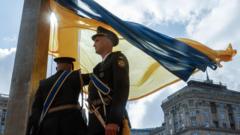The historic event in Moscow features foreign leaders but is marred by allegations of ceasefire violations.
**Putin Marks 80th Victory Day Amid Tensions and Ceasefire Claims**

**Putin Marks 80th Victory Day Amid Tensions and Ceasefire Claims**
Tight security surrounds Russia's Victory Day parade as Ukraine reports ongoing attacks.
In the shadow of ongoing conflict, President Vladimir Putin presided over Russia's Victory Day celebrations, commemorating the 80th anniversary of the Soviet Union's triumph over Nazi Germany. The event occurred under heightened security as Ukraine alleged continued strikes against its territory, challenging Russia's claims of a ceasefire.
The Kremlin announced a unilateral, three-day ceasefire beginning on May 8, ostensibly to create a peaceful atmosphere for the parade, but Ukraine's leadership has dismissed it as a mere “theatrical show” meant to shield the event from real conflict. Despite the ceasefire, Ukrainian military reports indicate that they faced thousands of attacks from Russian forces, disputing claims by Russia that hostilities had ceased.
With over 20 international leaders, including Chinese President Xi Jingping, attending the parade in Red Square, Moscow showcased an array of military assets, demonstrating its continuing military might. Despite Zelensky's warnings of potential danger due to ongoing hostilities, analysts believe Ukraine is likely to refrain from targeting the event in light of the foreign diplomats’ presence.
In a recent address, Ukrainian President Volodymyr Zelensky reiterated Ukraine's willingness to engage in a real ceasefire, calling for Russia to match their declarations with tangible actions. He criticized the Kremlin for not adhering to the ceasefire terms as chaos reportedly continued along the front lines, with countless skirmishes and missile strikes reported even after the truce commenced.
Adding to the tension, Zelensky requested a more substantial ceasefire duration, something he argues is vital for peace and stability in the region. Meanwhile, former U.S. President Donald Trump echoed calls for an unconditional ceasefire, indicating potential consequences for those obstructing peace efforts.
As tensions remain high, the symbolic celebration of Victory Day becomes intertwined with the complexities of ongoing warfare, highlighting a stark divide in narratives from Russia and Ukraine. With both sides reinforcing their positions, the prospect for genuine dialogue and lasting peace appears uncertain.
The Kremlin announced a unilateral, three-day ceasefire beginning on May 8, ostensibly to create a peaceful atmosphere for the parade, but Ukraine's leadership has dismissed it as a mere “theatrical show” meant to shield the event from real conflict. Despite the ceasefire, Ukrainian military reports indicate that they faced thousands of attacks from Russian forces, disputing claims by Russia that hostilities had ceased.
With over 20 international leaders, including Chinese President Xi Jingping, attending the parade in Red Square, Moscow showcased an array of military assets, demonstrating its continuing military might. Despite Zelensky's warnings of potential danger due to ongoing hostilities, analysts believe Ukraine is likely to refrain from targeting the event in light of the foreign diplomats’ presence.
In a recent address, Ukrainian President Volodymyr Zelensky reiterated Ukraine's willingness to engage in a real ceasefire, calling for Russia to match their declarations with tangible actions. He criticized the Kremlin for not adhering to the ceasefire terms as chaos reportedly continued along the front lines, with countless skirmishes and missile strikes reported even after the truce commenced.
Adding to the tension, Zelensky requested a more substantial ceasefire duration, something he argues is vital for peace and stability in the region. Meanwhile, former U.S. President Donald Trump echoed calls for an unconditional ceasefire, indicating potential consequences for those obstructing peace efforts.
As tensions remain high, the symbolic celebration of Victory Day becomes intertwined with the complexities of ongoing warfare, highlighting a stark divide in narratives from Russia and Ukraine. With both sides reinforcing their positions, the prospect for genuine dialogue and lasting peace appears uncertain.





















